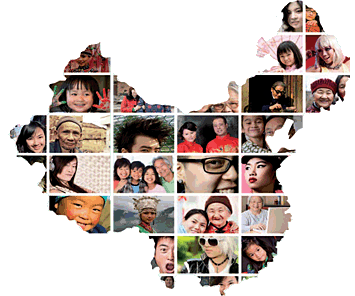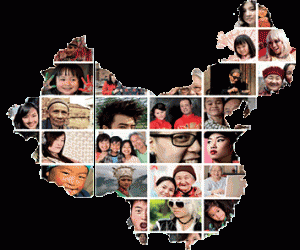China’s Diversity: Harmonious Society?
One of the most appealing reasons to travel to China is to experience a completely different culture and way of life. However, the diversity within China is often completely overlooked by people in the West. Anyone who witnessed the opening ceremony of the 2012 Beijing Olympics will have noted a deliberate effort to celebrate the diversity (but also unity) throughout China. Indeed, China is a multi-ethnic, multilingual and multicultural society, boasting 56 different ethnic groups across the country. The dominant ethnic group, the Han, make up 92% of the population. The remaining 8% are spread across five-eighths of China’s territory lending them a certain amount of political and social importance.
However, even within the Han majority there is a great deal of lingual and cultural diversity. Before travelling to Shaoxing in 2012 to teach English, I had been lucky enough to visit Hong Kong and Guangzhou in southern China. The differences were striking. Most obviously, there is the divide between Mandarin and Cantonese – two languages that, although sharing certain similarities in vocabulary, are not mutually intelligible. As such, Cantonese can be considered more broadly as a separate culture. For instance, Cantonese cuisine is renowned throughout China for being rather eclectic, including dishes such as Zhū dù (pig’s stomach) and Ji Jiao (chicken feet). Moreover, Southern China also boasts it’s own popular music, known as “Cantopop”, with many artists from Beijing and Taiwan opting to record Cantonese versions of their songs.
Local culture, then, plays an important part in China; with many Chinese people I spoke to very keen to promote their local delicacies and customs. For instance, whilst teaching in Shaoxing we were encouraged to try “smelly tofu”: a local delicacy served by street vendors. Although the repulsive smell could be detected from across the street, I was always assured the tofu itself tasted delicious by my pupils. Students in Shaoxing were also keen to tell me stories about local famous people such as Lu Xun, one of China’s most famous writers in the 20th century. A trip to his small, modest house in the centre of town was considered to be a highlight of the Summer school’s calendar. Pupils also beamed with pride at the mention of Zhou Enlai, the first Premier of the People’s Republic of China, whose ancestral home is in Shaoxing.
In short, it appears the Chinese people remain knowledgeable and proud of their local culture and history. However, this diversity is not always harmonious. Indeed, in the far-western provinces of China there has been serious unrest linked with separatist groups who desire autonomy from Beijing. The pleas of the Tibetan people have been well publicised through the Dalai Lama, but the Uighurs of Xinjiang province have also been involved in several instances of ethnic violence. These are, first and foremost, territorial disputes, but relations between Han-majority and Uighur-minority have also been exacerbated by what is perceived to be Han chauvinism and Beijing’s “forced assimilation” of ethnic minorities into Han way of life. Policies such as the encouraged migration of Han Chinese to western provinces such as Xinjiang (which has now altered the demographic of the province’s capital, Urumqi, to 90% Han and 10% Uighur) and the forced teaching of Mandarin Chinese in school exemplifies this. Moreover, the branding of Uighur separatists as “terrorist groups” by the CCP has helped justify the government’s harsh crackdown both on a domestic and international level.
As such, for pupils in my class, China’s western provinces and their inhabitants were seen as a rather mysterious. In general, there seemed to be few ethnic minorities in Shaoxing. There was only one restaurant ran by a Hui Muslim couple but it was usually empty. However, the subject of China’s ethnic minorities and Western provinces often encouraged lively discussion in classroom. For instance, when discussing a lesson on ‘Adventures’, one student told me of his dangerous and exciting trip to Tibet, a place considered to be distant and foreign. His enthusiastic tone and the reaction he received from his classmates told me that, despite its reputation as one of the most dangerous provinces in China, it was considered to be a rather exciting and exotic place to visit. Moreover, this perception was reinforced by my trip to Shanghai Museum, which included an exhibition showcasing the “costumes” worn by ethnic minorities in China throughout the ages.
Students also shared similar observations concerning rural areas in general. When comparing the city to the countryside, students often claimed that the countryside was dangerous, perhaps simply because of its distance from the city. Most seemed reluctant to participate in outdoor activities such as camping or hill walking. They also commented on how the countryside held limited opportunities due to a lack of jobs and technology.
However, when pushed to answer questions on separatism in China, students almost always towed the party line. Outgoing President Hu Jintao based his time in power around the ultimate goal of establishing a “harmonious society” – a call for stability and unity as China modernises and moves forward. As such, students often reiterated their faith in the Communist Party (despite recognising the problem of rampant corruption throughout the political system) and spoke of their fear of “social chaos” if the political system was to be challenged at this stage in China’s development. At this stage, therefore, maintaining the territorial integrity of China appears to be paramount to the development of China as a great power in the 21st century.
In sum, whilst China’s diversity is generally celebrated throughout the country, it is clear that said differences are often pronounced and can sometimes lead to confrontation. Indeed, as inequality continues to grow between China’s coastal conurbation and it’s western, rural provinces, Hu Jintao’s successor, Xi Jingping, may find it far more difficult to talk of developing a “harmonious society” across China’s provinces. On a different level, China’s diversity can come with some serious practical difficulties – pupils in my class often complained about the harsh dialect spoken by those from Beijing and Shanghai and the difficulty they had understanding them. In this sense, it is important to recognise that Chinese people are a proud nation: but this pride is rooted first and foremost in the local area. In such a vast, populated country this should come as no surprise and is definitely something to appreciate whilst visiting China.
By Callum Aitken, summer teacher in Shaoxing (summer of 2012)



Leave A Comment
You must be logged in to post a comment.